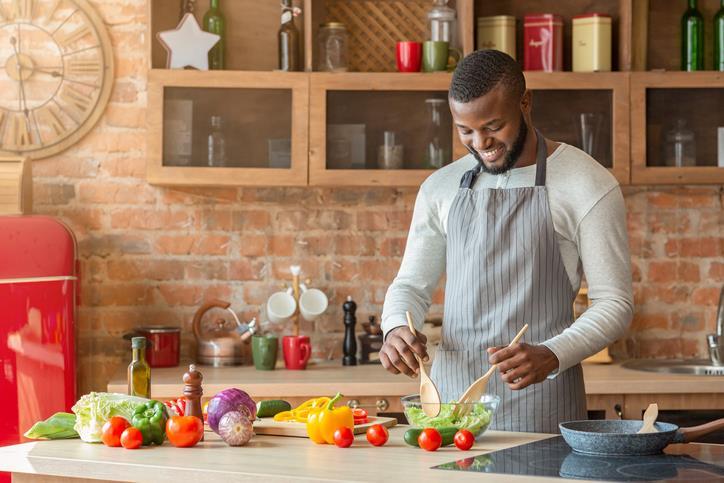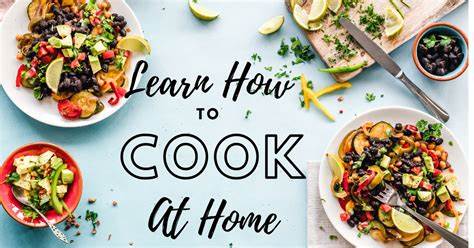Cooking is a valuable life skill that anyone can learn, and with the rise of digital resources, learning to cook from home has become easier and more enjoyable than ever. Whether you are a beginner wanting to make your first meal or someone looking to improve your culinary skills, this guide will help you understand the right way to learn cooking from home. It covers everything from setting up your kitchen to finding the best learning resources and maintaining motivation throughout your cooking journey.

Why Learn Cooking from Home?
Learning cooking at home offers many benefits. It saves money, helps you eat healthier, and gives you control over ingredients and flavors. Cooking your meals also connects you to culture and tradition, providing comfort and creativity. Moreover, cooking at home can be a fun activity for the entire family, fostering togetherness.
Especially during times like the recent global pandemic, cooking from home became a necessity, encouraging many to start their culinary journey. This trend continues as more people appreciate the control, quality, and joy that home cooking offers.
Preparing Your Kitchen for Learning
Before starting your cooking lessons, it is important to organize a space that is welcoming and practical. A clean, clutter-free kitchen with basic tools is the best place to start. You don’t need fancy gadgets or expensive ingredients. Start with essential utensils such as knives, cutting boards, pots, pans, measuring cups, and mixing bowls.
Good lighting and ventilation can make your kitchen more comfortable and safe. Make sure your workspace is clean and everything you need is within reach. This will help you focus on learning without unnecessary distractions.
Starting with Basic Skills
Like learning any new skill, cooking begins with basics. Focus on understanding simple techniques such as chopping vegetables, boiling, frying, and baking. Practice how to read recipes carefully and measure ingredients correctly.
Basic skills form the foundation of all cooking. When you master them, you can try more complex dishes. Many online tutorials and cookbooks offer beginner-friendly recipes to help you gain confidence step by step.

Choosing the Right Recipes for Beginners
Start with recipes that are easy to follow and require fewer ingredients. Simple dishes like scrambled eggs, pasta, vegetable stir-fries, and soups are perfect for beginners. These recipes help you practice techniques without feeling overwhelmed.
As you progress, gradually challenge yourself with more complicated dishes that introduce new flavors, cooking methods, and ingredients. The key is to enjoy the process rather than rush to perfect every dish.
Learning Through Online Resources
One of the biggest advantages of learning cooking from home is access to online resources. Websites, cooking apps, YouTube channels, and online cooking classes offer a variety of ways to learn. Many platforms have step-by-step video tutorials which are easy to follow.
For example, platforms like YouTube have countless free videos on cooking basics and advanced techniques. Websites like Allrecipes, BBC Good Food, and Serious Eats provide tested recipes and helpful tips. You can also join online cooking communities and forums where you can ask questions and share your cooking experiences.
Importance of Practice and Patience
Cooking is a skill that improves with practice. Don’t be discouraged by mistakes — they are part of the learning process. Every cook, even professionals, have experienced failed dishes. What matters is learning from these experiences.
Patience is important. Take your time to understand each step and don’t rush. With every meal you prepare, your skills, taste, and confidence will improve.
Using Fresh and Healthy Ingredients
Cooking from home gives you the advantage of choosing fresh and healthy ingredients. Try to use seasonal vegetables, whole grains, lean proteins, and natural spices. This not only improves the taste of your food but also benefits your health.
Experiment with herbs and spices to make your dishes flavorful without relying on extra salt or unhealthy additives. Learning about nutrition and balanced meals can make your cooking more rewarding.
Safety and Hygiene in the Kitchen
While learning to cook, understanding kitchen safety and hygiene is crucial. Always wash your hands before and after handling food. Keep raw and cooked foods separate to avoid contamination.
Use sharp knives carefully and always cut away from your body. Make sure to cook foods at the right temperature to avoid foodborne illnesses. Cleaning as you go will keep your kitchen tidy and safe.
Engaging Family and Friends
Cooking can be a wonderful way to connect with your family and friends. Invite others to join you in cooking sessions or share the meals you prepare. This encourages a sense of community and makes cooking more fun.
Teaching children to cook from a young age is a great investment in their independence and health. Even simple tasks like washing vegetables or stirring can build their interest and confidence in the kitchen.
Exploring Different Cuisines
Once you have mastered basic cooking skills, you can explore different cuisines to expand your culinary horizons. Cooking dishes from various cultures introduces you to new flavors, ingredients, and cooking methods.
Trying recipes from Italian, Indian, Mexican, Chinese, or Middle Eastern cuisines can be exciting and educational. It also broadens your palate and appreciation for global food diversity.
Tracking Your Progress
Keeping a cooking journal or using an app to track your progress can help you stay motivated. Note what recipes you tried, what worked well, and what you want to improve. You can also collect recipes that you love and customize them over time.
Tracking progress allows you to see how far you have come and encourages you to keep learning.
When to Take Professional Help
While learning at home is effective, sometimes professional guidance is helpful. If you want to specialize or deepen your knowledge, consider enrolling in cooking classes, workshops, or culinary schools.
Professional chefs and instructors can teach advanced techniques, kitchen management, and presentation skills that go beyond home cooking.
Conclusion
Learning cooking from home is a rewarding and practical journey that anyone can embark on. With the right preparation, patience, and access to resources, you can develop skills that will serve you for a lifetime. Remember to start small, practice regularly, maintain safety, and enjoy the process of creating delicious meals.
Cooking at home not only nourishes your body but also your mind and relationships. So grab your apron and start cooking — your kitchen is your new classroom!
The Best Way to Manage Study During Holidays
References
- BBC Good Food. (n.d.). How to learn to cook from scratch. Retrieved from https://www.bbcgoodfood.com/howto/guide/how-learn-cook-scratch
- Allrecipes. (n.d.). Easy recipes for beginners. Retrieved from https://www.allrecipes.com/recipes/1947/everyday-cooking/beginners/
- Smith, A. (2020). The Science of Cooking: Understanding the Basics. Culinary Press.
- Serious Eats. (n.d.). The fundamentals of cooking at home. Retrieved from https://www.seriouseats.com/fundamentals-of-home-cooking
- USDA. (2023). Food safety basics. United States Department of Agriculture. Retrieved from https://www.fsis.usda.gov/food-safety/safe-food-handling-and-preparation/food-safety-basics
- Harvard T.H. Chan School of Public Health. (2021). Healthy eating plate & healthy eating pyramid. Retrieved from https://www.hsph.harvard.edu/nutritionsource/healthy-eating-plate/

